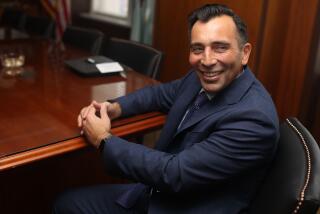The Long and Winding Road to Justice
- Share via
It’s just short of four years since the state Department of Motor Vehicles publicly accused Chrysler of reselling 118 cars to new buyers without telling them the vehicles had been repurchased from previous owners as “lemons.”
After protracted deliberations, an administrative law judge recommended in 1996 that Chrysler--which denied wrongdoing--be suspended from shipping vehicles into California for 60 days, and not be permitted to resell lemons at all for three years.
The department cut the proposed shipment ban to 45 days.
Then, in 1997, an appeals panel known as the New Motor Vehicle Board reversed the penalties, largely on procedural grounds.
In that decision, the board’s president, Daniel Livingston, made the revealing statement that it was correct to conclude that his group’s primary purpose is to protect auto dealers, who would be hurt by any decision to suspend Chrysler shipments.
Finally, on June 26 of this year, Sacramento Superior Court Judge Cecily Bond accepted parts of the board’s decision, rejected parts and remanded the matter back for reconsideration by the Office of Administrative Law and the DMV.
So, this matter is not over yet, by any means, and it points up once again how state agencies can be stymied by legal procedures that allow endless hearings, appeals and reconsiderations.
It’s not confined to the Chrysler case. Nearly two years after creation of the California Earthquake Authority, an interminable hearings process continues on what the permanent earthquake insurance rates should be.
ZIP Code pricing for auto insurance has been litigated for 10 years without final result.
And powerful elements in state government keep working to add to appeals processes. This is an issue in Gov. Pete Wilson’s attempt on behalf of Edison and other companies to rein in the Public Utilities Commission by subjecting its rulings to judicial review.
Four agencies of government are acting in the Chrysler case: the DMV, the New Motor Vehicle Board, the Office of Administrative Law and the Superior Court.
The outside counsel for the DMV, Marian Johnston, seemed unconcerned by the amount of time all this is taking. After all, she said, we must adhere to due process.
But does due process necessarily have to extend into infinity?
USC law professor Erwin Chemerinsky notes that while due process “requires notice and hearing before somebody loses life, liberty or property,” there is “always a trade-off between the need to have decisions reached in finality and the desire to have ongoing review.”
As for hearings processes that take so long, “it might well in hindsight have been done more quickly and still complied with due process,” he observed.
Sally Reed, director of the DMV, put it succinctly:
“I certainly would have preferred to make the penalty immediate. It does detract from the message we’re trying to send when it is delayed so long.”
Harry Snyder, a longtime state leader of the Consumers Union, contended I should blame Chrysler for litigating so long rather than blame state administrative procedures. But I don’t think the state or its courts have to be so compliant in allowing delays. Why, for instance, did Administrative Law Judge Keith A. Levy have to take 7 1/2 months to prepare his 1996 ruling after proceedings closed? There must be ways to streamline such work.
Rosemary Shahan of the private group, Consumers for Auto Reliability and Safety, said she feels Chrysler has “fought so hard because they thought, ‘This is the Wilson administration, and they’re going to cave.’ ”
But Chrysler says it would have preferred settling long ago.
Lewis Goldfarb, the auto maker’s assistant general counsel, still insists that the company did nothing wrong, saying, “No company would have gone through all the mudslinging we got if we believed we had engaged in the misconduct the DMV claimed.”
But Goldfarb said that as early as fall 1994, Chrysler offered to settle for $330,000, the same amount paid by General Motors in another lemon case earlier that year.
Later, he said, Chrysler was willing to settle for $2 million. But then Reed came in as DMV director and demanded $10 million.
Reed would neither confirm nor deny holding out for $10 million.
“There were a number of attempts of settlement with Chrysler,” she observed. “At several times, when a figure had been agreed to, Chrysler backed away.
“If a settlement were made, it would have to reflect the seriousness of the offense and the fact that through a number of appeals Chrysler has been unwilling to acknowledge wrongdoing.”
Goldfarb, however, asserted, “We never backed out of a single deal.”
Frank Zolin, DMV director at the time the case began, said, “My personal opinion is that suspending Chrysler shipments does not solve the problem. It probably exacerbates it. It would have been more desirable to settle.”
But, he says, the fact is that of the Big Three American auto makers, Chrysler was the worst offender in passing on lemons to new customers without notifying them.
Ford, in particular, “was very, very different, much more accommodating,” he observed. “Their lawyers came by and helped us develop new enforcement forms.”
I accept there are questions whether involving Chrysler dealers in the penalties for what the manufacturer may have done was fair, although a 45-day suspension of shipments would still have allowed stockpiling before and quick reshipments afterward.
But the main point is that these kinds of penalty decisions should be made and implemented, or guilt or innocence resolved, in less than four years if public respect for government processes is to be maintained.
*
Ken Reich can be contacted with your accounts of true consumer adventure at (213) 237-7060, or by e-mail at [email protected]






